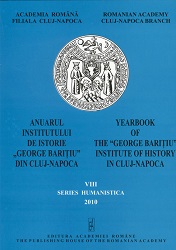TEORIA GENEZEI CAPITALISMULUI LA MAX WEBER
Max Weber’s Theory of the Genesis of Capitalism
Author(s): Ion AluasSubject(s): Social Sciences
Published by: Editura Academiei Române
Keywords: Max Weber; genesis of capitalism; Protestantism; spirit of capitalism,
Summary/Abstract: The intellectual biography of Ion Aluaş is complex and dual since he was officially a Marxist sociologist, but related to his scientific conscience he considered himself a Weberian. In a society dominated by “Marxist” “Leninist” ideology Ion Aluaş assumed the “Marxist theory”, as it can be seen in the text that is now published in several versions: the criticism of “bourgeois sociology” and neo-Marxism. The Weberian dimension of his thought appears stronger today and is characterized by intellectual courage on the one hand and on the other hand by what is called “resistance through culture”, which he promoted in his sociological doctrine courses and field research from Ţara Oaşului and Apuseni Mountains. Max Weber’s work has found a “via Moscow”, as he liked to say, referring to the Lomonosov University in the capital of the Soviet empire, where he took doctoral studies, from which was expelled because of his protest against the forced collectivization of agriculture. For many years, the sociological doctrine courses at “Babeş-Bolyai” University spoiled generations of students, especially because Weberian sociology had been presented in a exhaustive and extensive manner; this is probably due to the fact that at that time the German sociologist had nothing translated to Romanian. In those lectures Ion Aluaş constantly tried to approach the work of Weber in an original way by translating his key concept of “Ideal type” by “matrix type”. After the events of 1989 the sociologist analyzed Weber’s “ambivalence”, leaving for posterity his sociological testament Choosing Max Weber, probably written for Weber’s Centenary in Cluj-Napoca (1994), initiated by him; his premature death in March the same year put an end to his passionate admiration for the author of The Protestant Ethic and the Spirit of Capitalism. Ion Aluaş’s option for Weber “was decided at that level of human personality in which emotions play an essential role. The first readings of the Weberian works have aroused in me an emotional wave of sympathy, interest, curiosity I had never met in any other reading of the last decade”. However, the “emotional” component, the “option" is not devoid of critical spirit; this critical spirit reveals that Ion Aluaş read Weber through Marx, and Marx through Weber. “The critical reflection which accompanied and formed my attitude towards Weber introduced adjustments, mitigated impulses, softened effusions, allowed taking distance. For me, Max Weber remains – along with Marx, with whom he has a lot in common – the ultimate sociologist, as he should be or as he impersonated it in the non-Marxist sociology”. The text that we publish is a typescript of 9 pages, with its classic 31 lines on whose first page is penciled “Aluaş”. The text has some ball-pen corrections, including the edge of the pages; with the sociologist’s recognizable handwriting.
Journal: Anuarul Institutului de Istorie »George Baritiu« din Cluj-Napoca - Seria HUMANISTICA
- Issue Year: VIII/2010
- Issue No: 8
- Page Range: 393-402
- Page Count: 9
- Language: Romanian

